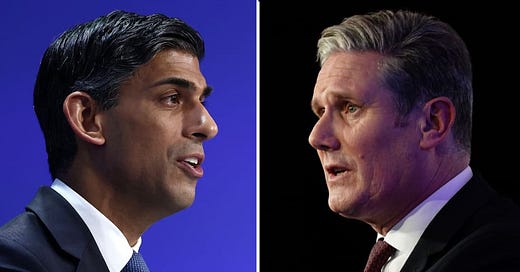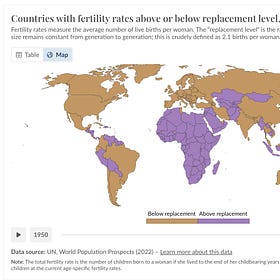The results of Thursday’s general election in Britain were a poignant reminder of two things: first, first, the abysmal failure of the Conservative party to deliver or inspire their voter base; and second, the tendency of the UK’s electoral system to protect established parties, at the cost of true political innovation.
This election was a Conservative loss, more than a Labour win
The Conservatives’ defeat at the hands of Labour is not attributable to a burst of public enthusiasm for Labour, nor to the fact that Reform split the conservative vote. Rather, Labour’s victory was virtually guaranteed by the Conservatives’ own ineptitude and corruption, which turned off many traditional Conservative voters, and laid the groundwork for Farage’s Reform party. The Conservative Party failed their own voters and they failed Britain, so they got what was coming to them.
On many of the key issues that conservative voters care about, the Conservative party let them down badly. For example, in 2020 the Conservatives scrapped existing pandemic protocols and decided instead to plunge the economy and health services into chaos with unprecedented lockdowns and hospital shutdowns. The “Conservatives” threw fiscal responsibility out the window as they pumped taxpayers’ money into furlough schemes to essentially pay people not to work, for months on end.
A paid subscription supports my work in defence of freedom and unlocks access to subscriber-exclusive posts.
These incredibly expensive and disruptive lockdowns worsened people’s health by depriving them of access to basic services such as cancer screenings, fuelled unemployment and inflation, and needlessly induced a national panic over a disease that could have been managed by concentrating protective measures on moderate to high-risk populations, such as the elderly, frail, and immuno-compromised.
The Tories threw civil rights under the bus, by imposing vaccine mandates on healthcare providers, heavily restricting freedom of movement and worship, creating abortion “buffer zones” that authorised police officers to harass silent protesters, and passing an Online Safety Bill that included measures against the notoriously slippery and undefinable concept of “hate speech.”
This is all before we even get into their embrace of “net zero” policies with little consideration for their economic impact, and their conspicuous failure to convincingly tackle growing waves of violent crime, increasing levels of illegal immigration, worsening public services, and an unaffordable housing market.
An electoral system not fit for purpose
But there was more at stake in this election than the demise of the Tories. This election also exposed the patently unrepresentative character of the British electoral system.
Unlike systems of Proportional Representation, in which minority parties have a real shot at getting significant representation in parliament, the UK’s first-past-the-post system means that a party with a third of the popular vote, like Labour, can comfortably secure an absolute majority in the parliament, with 411 seats, while a party like Reform, with 14% of the popular vote, barely squeezes in 5 seats, or less than a hundredth of the 650-strong parliament.
This means that new parties that seek to challenge the status quo have to outperform the leading party in many constituencies across the country in order to have any chance of winning a large number of seats. It also means that minority parties have a real uphill battle in convincing potential voters to support them in a system that is designed to prevent them from being elected.
The net effect of this system is to artificially prop up old and established parties, and perpetuate their dynasties, at the cost of political innovation and entrepreneurship. In this sort of system, many voters are likely to support one of the dominant parties just because they think their vote will be wasted on a third party. Other voters are likely to just stay at home if they are disillusioned with the major parties, because they don’t see the point of voting for third parties that are very unlikely to do well in a first-past-the-post system.
In the British electoral system as it currently stands, voters who are fed up with both Labour and the Conservatives must accept that it is very unlikely their views will be represented to a significant degree in parliament, until their preferred party becomes one of the two leading parties in the country. That is a terribly high bar to have to meet.
The net result of the British electoral system is to license a single party to utterly dominate national politics even though it only wins a positive mandate from a minority of voters - in this particular case, 33%. So the will of a majority of voters is represented by a parliamentary minority. Voters deserve a lot better than that. Britain deserves a lot better than that.
Thanks for reading! If you appreciate this content, and are a free subscriber, consider upgrading to a paid subscription today. A paid subscription supports my work in defence of freedom and unlocks access to subscriber-exclusive posts.
Don’t forget that you can also find me on Twitter/X, Youtube, and Telegram. My academic profile and publications are listed at davidthunder.com.
Please find below some recent posts from the Freedom Blog.
The Myth of the “Far Right Surge” in Europe
There has been much talk of a “far right surge” in the European Parliament. For example, BBC ran a headline, “Far right eyes Europe vote surge…,” shortly before the elections. On June 5th, Politico reported, “As the far right surges, this week’s European Parliament election will reorder the Continent’s political landscape.” One of CNN’s
Is the Fear of Having Children Bringing Western Cultures to the Brink of Extinction?
We are living at a time when a large segment of the world - particularly societies in Europe, North America and Asia - no longer views having children as something desirable or worthwhile. Whereas before, remaining childless was something people often felt shame over, even if it was through no choice of their own, we are now living at a unique historic …
WHO Illegally Sneaks New Financing Mechanisms Into International Health Regulations
The World Health Assembly recently convened its annual meeting (27th May to 1st June) in Geneva, Switzerland. Delegates failed to reach agreement on a new pandemic treaty, but resolved to conclude negotiations on such a treaty within a year, and passed significant amendments to the International Health Regulations (2005).
The Global Disinformation Index Is Toxic for Our Information Eco-System
In January of this year, Unherd, a conservative British news and opinion platform, received confirmation from the Global Disinformation Index (GDI) that Unherd’s dramatically low ad revenue (by their own estimation, between 2% and 6% of what they would normally be expected to receive) was due to the GDI rating them as an “unsafe” website for advertisers…
The Empty Promises of Feminism
The great paradox of the “liberated” woman of our era is that in unshackling herself from traditional roles and expectations, she can also lose her bearings and sense of purpose in life. A life that seems “liberated” from oppressive obligations and ties may become empty and aimless.










